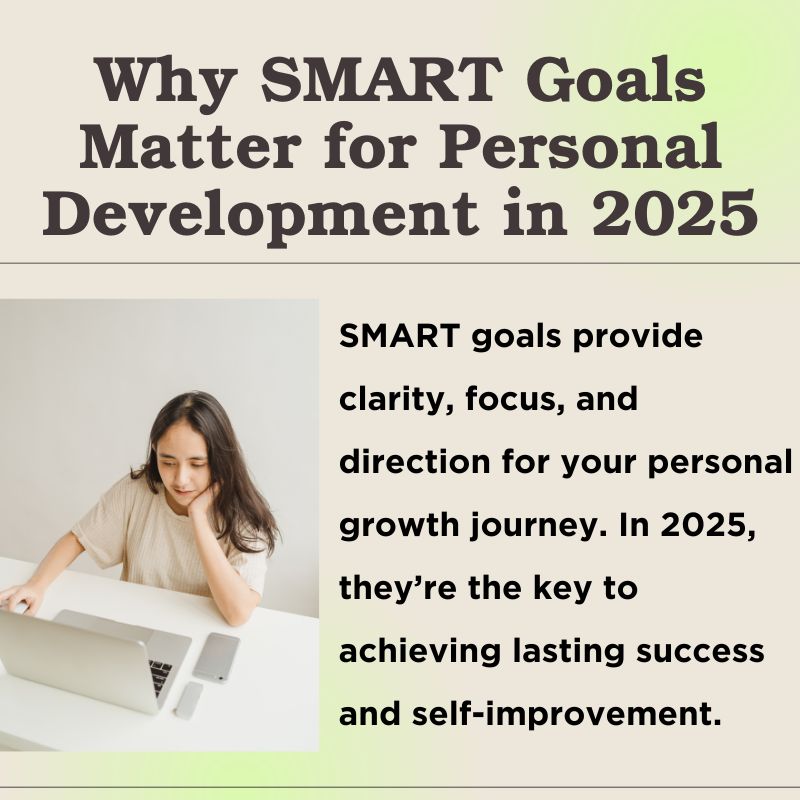Personal development is one of the most powerful investments you can make in yourself. But without clear direction, even the most ambitious plans can quickly lose momentum. That’s where SMART goals for personal development success come in.
In 2025, with evolving workplace demands, technology shifts, and greater focus on mental well-being, adopting the SMART framework is more critical than ever. Whether you want to boost confidence, improve communication, master leadership, or enhance productivity, SMART goals offer a structured roadmap to help you stay accountable and measure progress effectively.
What Are SMART Goals?
SMART goals are specific, measurable, achievable, relevant, and time-bound objectives designed to make your personal and professional aspirations more actionable.
- Specific: Clear, detailed, and well-defined.
- Measurable: Progress and success can be tracked.
- Achievable: Realistic and within your capacity.
- Relevant: Aligned with your long-term vision.
- Time-bound: Set within a defined deadline.
By using SMART goals for personal development success, you avoid vague objectives like “I want to be better at communication” and instead create actionable steps such as:
“I will improve my public speaking by attending a weekly workshop and delivering one presentation within three months.”
Why SMART Goals Matter for Personal Development in 2025

The world of work and life balance has changed dramatically. Technology, remote work, and increasing focus on mental health mean individuals need structured ways to grow personally and professionally.
- Clarity in a fast-paced world: SMART goals reduce uncertainty.
- Accountability: Regular milestones keep you motivated.
- Efficiency: Focuses your time and energy on what truly matters.
- Adaptability: Goals can evolve as priorities shift.
- Confidence building: Achieving small wins boosts self-belief.
Using SMART goals for personal development success ensures that every step you take contributes to your long-term growth.
SMART Goals for Personal Development Success: Step-by-Step
Follow this structured step-by-step process to set SMART goals that turn your personal development vision into achievable success.
1. Understand Individual Aspirations
Before setting goals, identify what areas of your life you want to improve: career advancement, health, financial stability, or emotional well-being. Journaling, self-reflection, or mindfulness practices can help clarify what truly matters.
2. Apply the SMART Criteria
Break your aspirations into SMART goals. Instead of “I want to read more,” set: “I will finish one self-development book each month for the next six months.”
3. Tailor Goals to Roles and Skills
Different aspects of life require different goals:
- Career: Improve project management skills.
- Health: Follow a structured clean eating plan.
- Personal Growth: Practice mindfulness for 10 minutes daily.
4. Provide Regular Check-ins and Feedback
Track your progress weekly or monthly. Use apps, accountability partners, or mentors to review your achievements.
5. Offer Resources and Support
Enroll in online courses, read personal growth books, or join communities that encourage learning and resilience.
6. Celebrate Achievements
Recognize small wins to stay motivated. Rewarding yourself creates positive reinforcement.
7. Adaptability and Continuous Learning
Life changes, and so should your goals. Stay flexible and reframe goals as needed.
SMART Goals Examples for Personal Growth Areas
Discover how SMART goals can be applied across various personal growth areas for lasting success
Career Development
- Specific: I will complete a professional certification in digital marketing.
- Measurable: Track course completion and test results.
- Achievable: Dedicate 5 hours weekly.
- Relevant: Aligned with my career path.
- Time-bound: Within 6 months.
Health & Fitness
- Specific: I will exercise 4 days a week.
- Measurable: Log workouts in an app.
- Achievable: Start with 30-minute sessions.
- Relevant: Supports my goal of better health.
- Time-bound: Consistently for 3 months.
Financial Growth
- Specific: Save $200 monthly in an emergency fund.
- Measurable: Track bank statements.
- Achievable: Reduce non-essential expenses.
- Relevant: Builds long-term security.
- Time-bound: For 12 months.
Emotional & Mental Well-being
- Specific: Meditate 10 minutes daily.
- Measurable: Use a meditation app.
- Achievable: Start with short sessions.
- Relevant: Improves focus and mindfulness.
- Time-bound: Practice daily for 90 days.
How SMART Goals Boost Motivation and Consistency
- Clarity reduces procrastination.
- Measurable progress fuels motivation.
- Short-term wins build long-term success.
- Deadlines prevent endless delays.
- Celebrating progress improves emotional resilience.
Future of SMART Goals in Personal Development (2025 & Beyond)
- Integration with AI coaching tools for real-time feedback.
- Apps that track personal growth metrics alongside physical health.
- Blended approaches combining digital tools and human mentorship.
- Cross-cultural adaptability for global career success.
SMART goals remain timeless, but in 2025, technology makes it easier than ever to track, adapt, and succeed.
Final Thoughts
Using SMART goals for personal development success allows you to bridge the gap between aspirations and results. By making your goals specific, measurable, achievable, relevant, and time-bound, you set yourself up for sustainable success.
Personal growth isn’t about perfection it’s about consistent progress. Small steps, when tracked and celebrated, lead to lasting transformation.
Ready to start your personal growth journey? Explore more actionable strategies and self-improvement resources at MindScribes.
FAQs About SMART Goals for Personal Development Success
Q1. What makes SMART goals effective for personal development?
SMART goals are effective because they provide clarity, structure, and measurable outcomes, making personal growth more achievable.
Q2. How do I apply SMART goals to my career?
Define specific milestones such as certifications, measurable KPIs, and deadlines for skill development that align with your career goals.
Q3. Can SMART goals help with mental health?
Yes. Goals like practicing mindfulness for 10 minutes daily or journaling weekly can support mental clarity and well-being.
Q4. What are common mistakes when setting SMART goals?
Vague goals, unrealistic timelines, and lack of tracking often lead to failure. SMART criteria help overcome these.
Q5. Are SMART goals still relevant in 2025?
Absolutely. With workplace changes, remote collaboration, and evolving personal demands, SMART goals are more relevant than ever.

